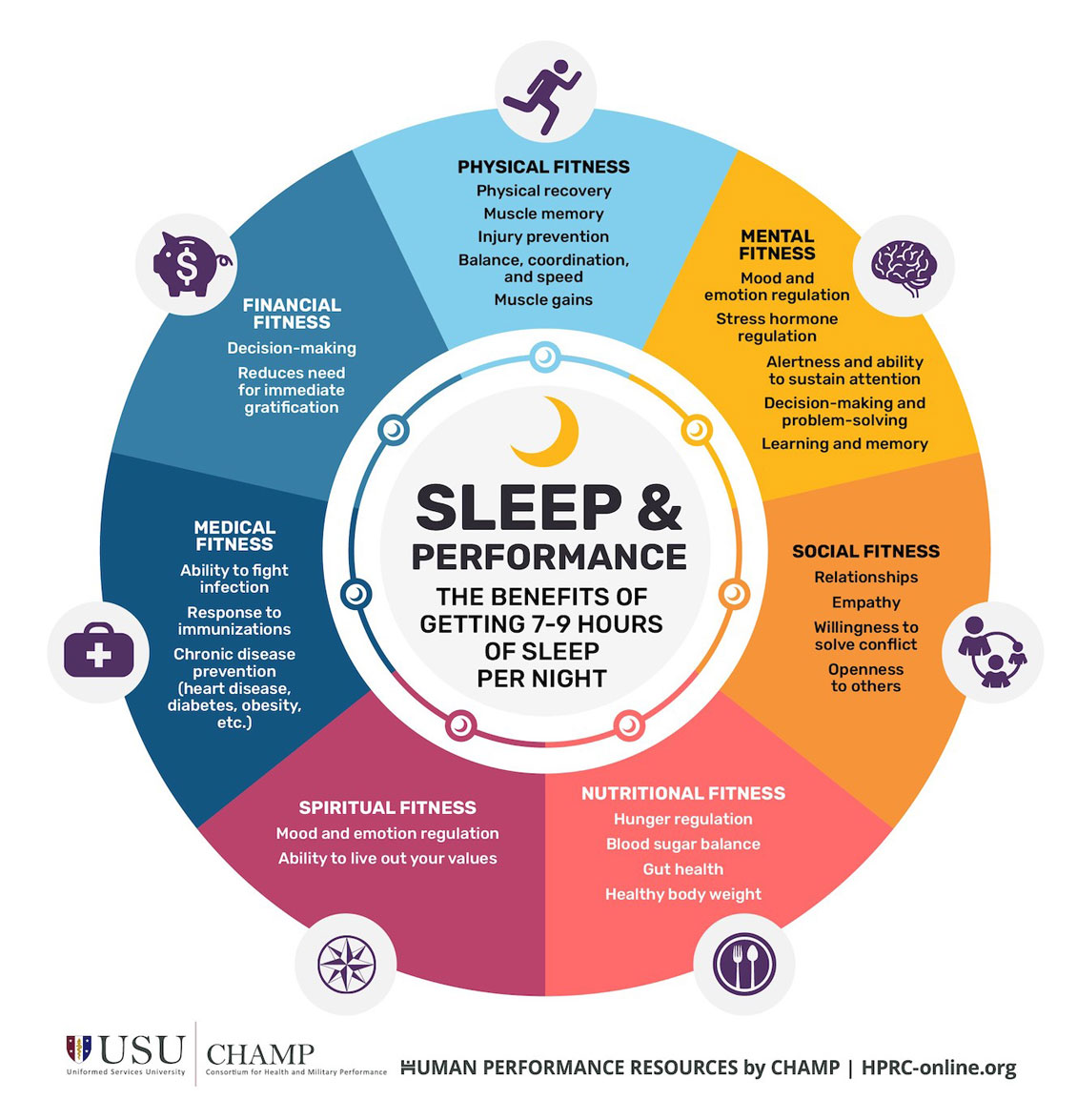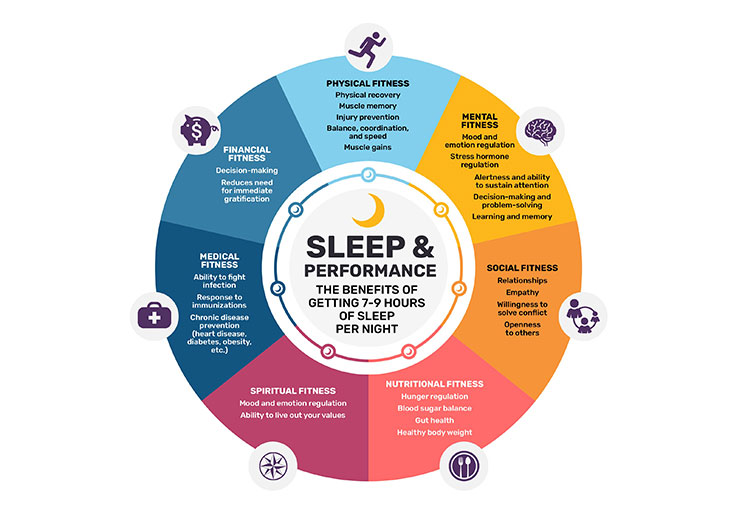Sleep is essential to your health, wellness, and military performance. Getting enough sleep helps your perform at your best in all areas of Total Force Fitness (TFF)—physical fitness, mental fitness, social fitness, nutritional fitness, spiritual fitness, medical fitness, and financial fitness. Print out the graphic below for a quick reminder of all the reasons you have to prioritize sleep to optimize your performance.

Sleep & Performance
The Benefits of Getting 7-9 Hours of Sleep Per Night
Physical Fitness
- Physical recovery
- Muscle memory
- Injury prevention
- Balance, coordination, and speed
- Muscle gains
Mental Fitness
- Mood and emotion regulation
- Stress hormone regulation
- Alertness and ability to sustain attention
- Decision-making and problem-solving
- Learning and memory
Social Fitness
- Relationships
- Empathy
- Willingness to solve conflict
- Openness to others
Nutritional Fitness
- Hunger regulation
- Blood sugar balance
- Gut health
- Healthy body weight
Spiritual Fitness
- Mood and emotion regulation
- Ability to live out your values
Medical Fitness
- Ability to fight infection
- Response to immunizations
- Chronic disease prevention (heart disease, diabetes, obesity, etc.)
Financial Fitness
- Decision making
- Reduces need for immediate gratification
Published on: July 1, 2022
References
Banks, S., & Dinges, D. F. (2007). Behavioral and physiological consequences of sleep restriction. Journal of Clinical Sleep Medicine, 03(05), 519–528. doi:10.5664/jcsm.26918
Basner, M. (2011). Sleep duration and chronic sleep debt: Are 6 hours enough? Biological Psychology, 87(1), 15–16. doi:10.1016/j.biopsycho.2011.02.015
Boyko, E. J., Seelig, A. D., Jacobson, I. G., Hooper, T. I., Smith, B., Smith, T. C., & Crum-Cianflone, N. F. (2013). Sleep characteristics, mental health, and diabetes risk. Diabetes Care, 36(10), 3154–3161. doi:10.2337/dc13-0042
Chennaoui, M., Vanneau, T., Trignol, A., Arnal, P., Gomez-Merino, D., Baudot, C., . . . Chalabi, H. (2021). How does sleep help recovery from exercise-induced muscle injuries? Journal of Science and Medicine in Sport, 24(10), 982–987. doi:10.1016/j.jsams.2021.05.007
Chuah, L. Y. M., Dolcos, F., Chen, A. K., Zheng, H., Parimal, S., & Chee, M. W. L. (2010). Sleep deprivation and interference by emotional distracters. Sleep, 33(10), 1305–1313. doi:10.1093/sleep/33.10.1305
Goel, N., Basner, M., Rao, H., & Dinges, D. F. (2013). Circadian rhythms, sleep deprivation, and human performance. In M. U. Gillette (Ed.), Chronobiology: Biological Timing in Health and Disease (Vol. 119, pp. 155–190). Oxford, UK: Elsevier (Academic Press).
Good, C. H., Brager, A. J., Capaldi, V. F., & Mysliwiec, V. (2019). Sleep in the United States military. Neuropsychopharmacology, 45(1), 176–191. doi:10.1038/s41386-019-0431-7
Guadagni, V., Burles, F., Ferrara, M., & Iaria, G. (2018). Sleep quality and its association with the insular cortex in emotional empathy. European Journal of Neuroscience, 48(6), 2288–2300. doi:10.1111/ejn.14124
Ghumman, S., & Barnes, C. M. (2013). Sleep and prejudice: A resource recovery approach. Journal of Applied Social Psychology, 43, E166–E178. doi:10.1111/jasp.12045
Harrison, E., Glickman, G. L., Beckerley, S., & Taylor, M. K. (2017). Self-reported sleep during U.S. Navy operations and the impact of deployment-related factors. Military Medicine, 182(S1), 189–194. doi:10.7205/milmed-d-16-00078
Harrison, Y., & Horne, J. A. (2000). The impact of sleep deprivation on decision making: A review. Journal of Experimental Psychology: Applied, 6(3), 236–249. doi:10.1037/1076-898x.6.3.236
Irwin, M. R. (2015). Why sleep is important for health: A psychoneuroimmunology perspective. Annual Review of Psychology, 66(1), 143–172. doi:10.1146/annurev-psych-010213-115205
Lim, J., & Dinges, D. F. (2008). Sleep deprivation and vigilant attention. Annals of the New York Academy of Sciences, 1129(1), 305–322. doi:10.1196/annals.1417.002
Mysliwiec, V., Walter, R. J., Collen, J., & Wesensten, N. (2016). Military sleep management: An operational imperative. U.S. Army Medical Department Journal, Apr-Sep(2–16), 128–134.
Paller, K. A., Creery, J. D., & Schechtman, E. (2021). Memory and sleep: How sleep cognition can change the waking mind for the better. Annual Review of Psychology, 72(1), 123–150. doi:10.1146/annurev-psych-010419-050815
Palmer, C. A., & Alfano, C. A. (2017). Sleep and emotion regulation: An organizing, integrative review. Sleep Medicine Reviews, 31, 6–16. doi:10.1016/j.smrv.2015.12.006
Tempesta, D., Socci, V., De Gennaro, L., & Ferrara, M. (2018). Sleep and emotional processing. Sleep Medicine Reviews, 40, 183–195. doi:10.1016/j.smrv.2017.12.005
Teyhen, D. S., Capaldi, V. F., Drummond, S. P. A., Rhon, D. I., Barrett, A. S., Silvernail, J. L., & Boland, D. M. (2021). How sleep can help maximize human potential: The role of leaders. Journal of Science and Medicine in Sport, 24(10), 988–994. doi:10.1016/j.jsams.2021.08.012
van der Helm, E., Gujar, N., & Walker, M. P. (2010). Sleep deprivation impairs the accurate recognition of human emotions. Sleep, 33(3), 335–342. doi:10.1093/sleep/33.3.335
Williams, S. G., Collen, J., Wickwire, E., Lettieri, C. J., & Mysliwiec, V. (2014). The impact of sleep on Soldier performance. Current Psychiatry Reports, 16(8), article 459. doi:10.1007/s11920-014-0459-7





